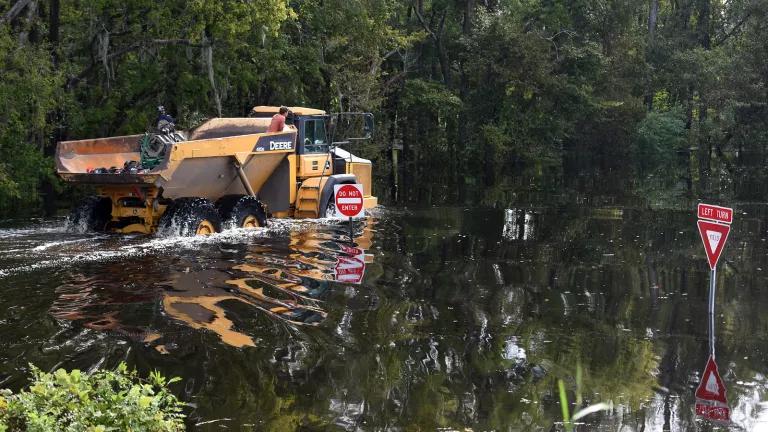More States Are Requiring Flood Disclosure
New home buyers and renters should have a right to know a property’s flood history before they commit to calling it home.

Debris piled up outside a home in the Queens, NY, neighborhood of Oceanside, damaged by flooding from Hurricane Sandy.
Walt Jennings/FEMA
New home buyers and renters should have a right to know a property’s flood history and risk before they commit to calling it home. However, most states keep prospective home buyers and renters in the dark about a home’s flood risk due to inadequate or nonexistent flood-related real estate disclosure laws.
Fortunately, that is starting to change.
NRDC has updated its scorecard of state flood disclosure laws. Since the last update in 2020, five states have improved their disclosure laws. New Jersey, New York, North Carolina, South Carolina, and Hawaii have all enacted — or started the ball rolling on — disclosure reforms that would give home buyers a right to know a home’s flood risk. New York and New Jersey have new laws that give similar rights to renters.

Explore our updated interactive map to learn about the most recent status of the nation’s flood-related disclosure laws. Below is information on each state that’s made changes, this year’s grade, and the grade they earned in 2020.
New Jersey (2023 grade: A, 2020 grade: F)
New Jersey previously received an “F” on NRDC’s flood disclosure scorecard but has now earned an “A”. In New Jersey, New Jersey Future, Waterfront Alliance, and NRDC successfully worked to reform the state’s dismal flood-related disclosure requirements. In Spring 2023, the New Jersey legislature voted to pass legislation, which received unanimous support in the Senate, granting home buyers and renters a right to know their flood risk. Governor Phil Murphy signed the legislation into law on July 3rd.
New Jersey now requires the following to be disclosed (* Indicates disclosure for home buyers, not rental property):
- Whether the property is in a 100-year or 500-year FEMA flood zone.
- If the property ever experienced any flood damage, water seepage, or pooled water due to a natural flood event, such as heavy rainfall, coastal storm surge, tidal inundation, or river overflow. If so, how many times.
- Whether the property is required by law to maintain flood insurance; and information pointing to online and updated future flood projection maps and data.*
- If the property ever received assistance from FEMA, the U.S. Small Business Administration, or any other federal disaster flood assistance for flood damage.*
- If there is a FEMA elevation certificate available for the property.*
- If a claim for flood damage to the property with any insurance provider, including the National Flood Insurance Program has been filed. *
- If the property is located in a designated wetland.*
In addition, the new law also requires coastal purchasers to be warned about the impacts of sea level rise.
It’s critical that renters and home buyers understand the flood risks they will be facing before making life-changing and expensive decisions about where to live. We are particularly pleased that the New Jersey law points home buyers and renters toward a state tool to analyze increasing future risk caused by climate change. We were also happy to see such overwhelming support for this law from all sectors, including the real estate sector.
Peter Kasabach, Executive Director at New Jersey Future.
New York (2023 grade: A, 2020 grade: F)
****After this blog posted, Governor Kathy Hochul, on September 22, 2023, signed legislation (A.1967/S.5400) into law, granting home buyers the right to know a property's flood history.****
New York previously received an “F” on NRDC’s flood disclosure scorecard but will soon earn an “A.”
New York previously had a loophole that allowed a property owner to opt-out of disclosure by paying the buyer a paltry $500. Even if a seller did fill out the New York Property Condition Disclosure Statement, the information concerning a property’s flood risk was minimal.
In 2023, Waterfront Alliance, Environmental Defense Fund, NRDC, and other partners in the Rise to Resilience Coalition helped pass legislation granting home buyers more comprehensive information on past flooding and future flood risk. Once signed into law, the state’s Property Condition Disclosure Statement will require sellers to disclose if:
- any or all of the property is located wholly or partially in the Special Flood Hazard Area ("SFHA"; "100-year floodplain") according to the Federal Emergency Management Agency's (FEMA's) current flood insurance rate maps for your area.
- the property is subject to any requirement under federal law to obtain and maintain flood insurance on the property.
- they ever received assistance, or are aware of any previous owners receiving assistance, from FEMA, the U.S. Small Business Administration, or any other federal disaster flood assistance for flood damage to the property.
- there is flood insurance on the property.
- there is a FEMA elevation certificate available for the property.
- a claim for flood damage to the property has been filed with any insurance provider, including the National Flood Insurance Program.
- whether the property has experienced any flood damage, water seepage, or pooled water due to a natural flood event, such as heavy rainfall, costal storm surge, tidal inundation, or river overflow.
In a state where flooding continues to be the most common and costly climate disaster, New Yorkers have a right to know the flood risk and history of a property they may call home. Advocates and the state legislature have worked to amend the existing, broken law that allows for home sellers to avoid disclosure by paying a mere $500 credit to a buyer at the time of closing. The Empire State is now on its way to achieving comprehensive flood risk disclosure laws for both buyers and renters.
Tyler Taba, Senior Manager for Climate Policy at the Waterfront Alliance.
In addition, Waterfront Alliance and NRDC helped pass legislation that gives renters the right to know their flood risk, which made New York the eighth state to have such flood-risk protection. The legislation passed the New York legislature and was signed into law in December 2022.
North Carolina (2023 grade: pending A, 2020 grade: D)
North Carolina previously received a “D” for flood risk disclosure but is poised to receive an “A” pending final adoption of a new mandatory real estate disclosure form by the state’s Real Estate Commission.
In February 2023, the North Carolina Real Estate Commission granted a petition for rulemaking filed by Southern Environmental Law Center (SELC) on behalf of NRDC, The North Carolina Justice Center, MDC Inc., The North Carolina Disaster Recovery and Resilience School, Robeson County Church and Community Center, and NC Field, requesting the agency amend the mandatory real estate disclosure form to include detailed questions about a property’s history of flood damages and insurance requirements. In July, the Commission began a public comment period on the revised disclosure form, which contained a version of our proposed questions pertaining to a property’s flood history and risk. Currently, the North Carolina Real Estate Commission is reviewing more than 700 comments, most submitted by supporters, and will be issuing a final disclosure form in September.
As flood risk increases across the state, ensuring real disclosures concerning flooding are fair and transparent is essential for protecting North Carolina families. The North Carolina Real Estate Commission is now poised to remedy this problem and grant home buyers the right to know a home’s flood history and other flood risk information. As we enter the most active part of hurricane season, the Commission is taking the right step at the right time.
Carlene McNulty, Director of Litigation at The North Carolina Justice Center.
South Carolina (2023 grade: A, 2020 grade: C)
South Carolina originally earned a “D” in 2018, a “C” in 2020, and now earns an “A”, largely due to the efforts of the Southern Environmental Law Center, Coastal Conservation League, and others. In 2019 the state’s Real Estate Commission took initial steps to improve flood disclosure and in 2023 they approved additional administrative changes to their mandatory disclosure statement, which home sellers must provide buyers.
Due to the most recent improvements, home buyers in South Carolina will now be told if:
- there were any flood problems to the property during ownership.
- flood hazards, wetlands, flood hazard designations, flood zones, or flood risk affecting the property.
- the property is currently insured through public (e.g., National Flood Insurance Program) or private flood insurance.
- private or public flood insurance (e.g., Federal Emergency Management Agency (FEMA)) claims filed on the property during your ownership.
- repairs made to the property because of flood events that were NOT filed with private or public insurance during your ownership.
- has federal flood disaster assistance (e.g., from FEMA, Small Business Administration, HUD) been previously received during your ownership.
- the property has been assessed for a beach nourishment project during your ownership.
People buying homes have to be informed before they can be prepared, and these updates empower new South Carolina homeowners with better information on flooding and erosion risks. It's a commonsense measure that helps make the state more resilient to the next storm.
Jenny Brennan, SELC Science and Policy Analyst.
Hawaii
While Hawaii remains a “D” grade for failure to specifically require disclosure of past flood damages and insurance requirements, it is the first state in the U.S. to pass a law requiring ‘sea level rise’ disclosures in a real estate transaction.
The state’s disclosure law now requires sellers to disclose the risks from sea level rise. Per statute, sellers must disclose whether the property lies within the Sea Level Rise Exposure Area, which is the area of shoreline that could be impacted by 3.2 feet of sea level rise. To identify a property's location relative to a sea level rise exposure area, visit the Hawai'i Sea Level Rise Viewer.
Surfrider Foundation was integral to enacting this major win for homebuyers.
More states need to act.
Despite recent successes, twenty-three states still do not require a seller to disclose to a buyer whether a home has previously flooded. States like Florida, Georgia, and Missouri, lack mandatory disclosure of flood risk. Per FEMA, the National Association of Realtors, and NRDC’s analysis, these states do not require a seller to provide a real estate disclosure form regarding flooding.
And floods are costly. A home buyer can incur tens of thousands of dollars in flood damage costs over the course of their mortgage, if they purchase a previously flooded home. According to a study NRDC commissioned from the actuarial firm Milliman, 6.6 percent of all homes (28,826 homes) sold in 2021 in the states of New Jersey, New York, and North Carolina, were estimated to have been previously flooded. This represents average annual costs due to flooding of $16 million in North Carolina, $18 million in New Jersey, and $23 million in New York for these high-risk properties.
Inadequate disclosure laws mean far too many people have little knowledge of whether the place they may call home has ever flooded and thus, is likely to flood again. This problem could be solved simply by having access to information, information that the seller or lessor of a home may have and should be required to provide.




